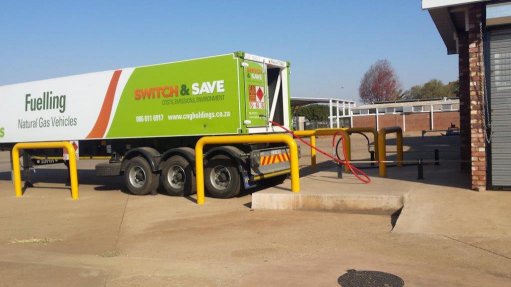
VIRTUAL NETWORK The ‘virtual’ distribution network is an innovative road-based delivery system of compressed-gas tube-trailer modules each storing compressed gas for distribution to customers
Through a rapidly expanding gas distribution network, gas supplier Virtual Gas Network is presenting the energy industry with lower energy costs and improved profitability, while also enabling energy producers and consumers to move towards meeting cleaner emissions targets.
Virtual Gas Network is a division of CNG Holdings. The company is providing the first commercial-scale supply of natural gas in South Africa, which is now available to businesses anywhere in a 300-km radius of Johannesburg.
With limited historical access, natural gas in South Africa has been used primarily as feedstock for the production of synthetic fuels; however, the discovery and development of extensive regional offshore methane-rich gasfields (especially in Mozambique) means it can now be expanded to meet a much greater industrial demand. According to Virtual Gas Network, this will radically change the country’s energy dynamic in the coming years as an increasing number of companies seek to enhance their operational performance and reduce their reliance on coal-based power.
Virtual Gas Network notes that natural gas provides about 20% of the world’s total energy requirements, with industry accounting for around 40% of total gas consumption, which is concentrated mainly in the food and beverage, pulp and paper, metals, chemicals, petroleum refining, glass, plastics and power generation (co- and tri-generation) industries.
Energy consuming equipment, such as boilers, furnaces, dehumidifiers, heaters and coolers, ovens, kilns and turbines can all be fired more efficiently using natural gas, which offers a consistent, high-energy content of about 39.22 MJ (10.89 kWh) per cubic metre that is significantly more cost effective than coal-based fuels, according to Virtual Gas Network.
In addition, besides lowering energy costs as a cheaper fuel, the cleaner combustion of natural gas also improves equipment and plant performance and reduces maintenance by reducing the build-up of carbon residues and stench within components, which leads to increased production time. In the near future, the reduced emissions of natural gas – with up to 27% less carbon dioxide, nitrogen oxide, hydrocarbons and particulate matter emitted than other fossil fuels – will become increasingly more critical as companies look to avoid carbon tax penalties.
Virtual Gas Network, together with fellow CNG Holdings division NGV Gas, has already converted a number of canneries, and manufacturing and assembly plants across a range of industries in South Africa, in addition to fleets of warehouse forklifts in various storage and intralogistical applications, to gas.
It does so through turnkey gas solutions that cover the supply and installation of all necessary conversion equipment, including a pressure regulating plant and all associated hoses, connectors, valves and civil work requirements, through to managing the delivery of a constant supply of natural gas, as required.
Any industrial company within a 300-km radius of CNG Holdings’ main compression station in Langlaagte, Johannesburg, can be supplied with gas. This includes businesses without direct access to the gas pipeline connecting Johannesburg and Pretoria, which can be serviced by Virtual Gas Network.
This ‘virtual’ distribution network is an innovative road-based delivery system of compressed-gas tube-trailer modules each storing compressed gas for distribution to customers. CNG Holdings, through Virtual Gas Network, manages the continuous delivery and collection of gas tube trailers as required, ensuring a guaranteed energy supply on a pay-as-you-use basis.
CNG Holdings, in partnership with the Industrial Development Corporation, is actively expanding this network to service a much wider geographic area, with Durban and Richards Bay soon to receive their first natural gas depots that will supply gas to the cities’ industry.